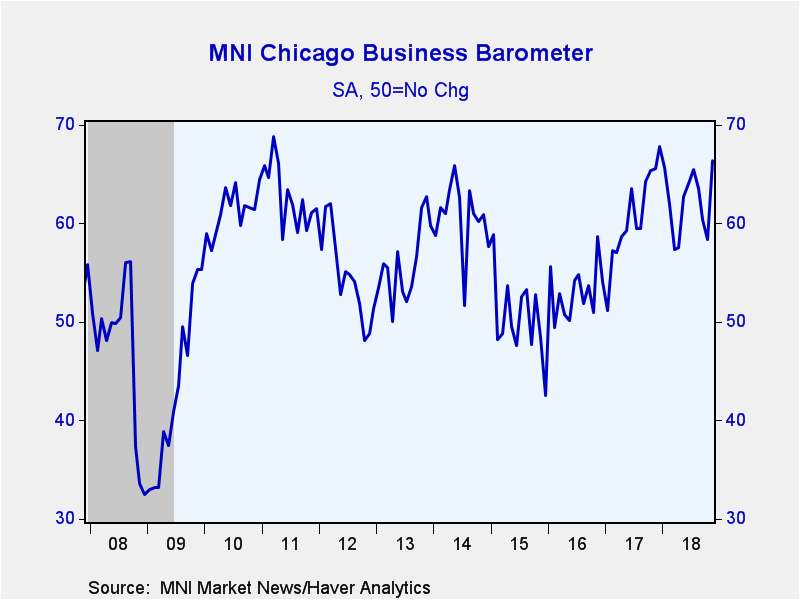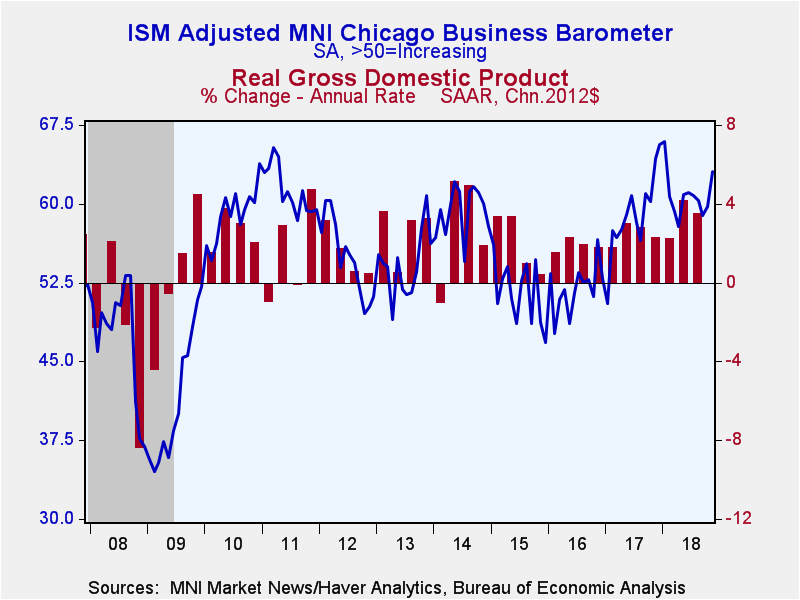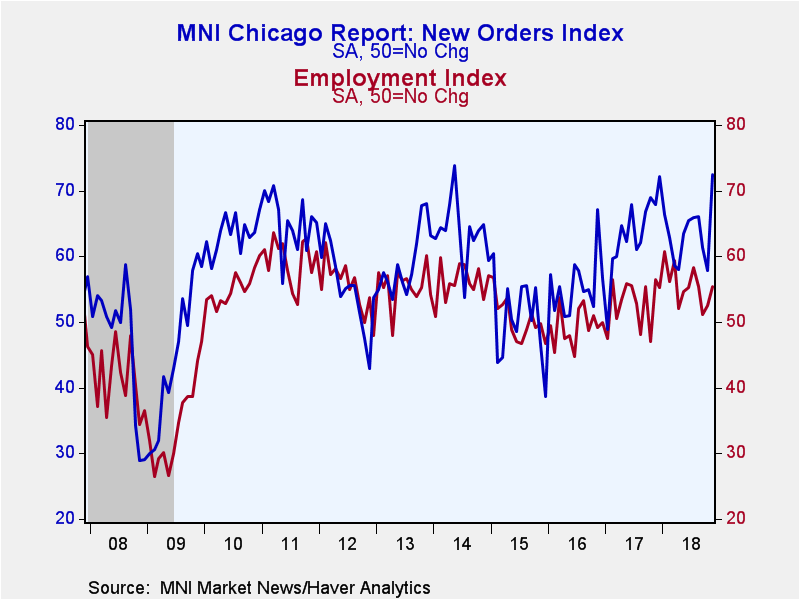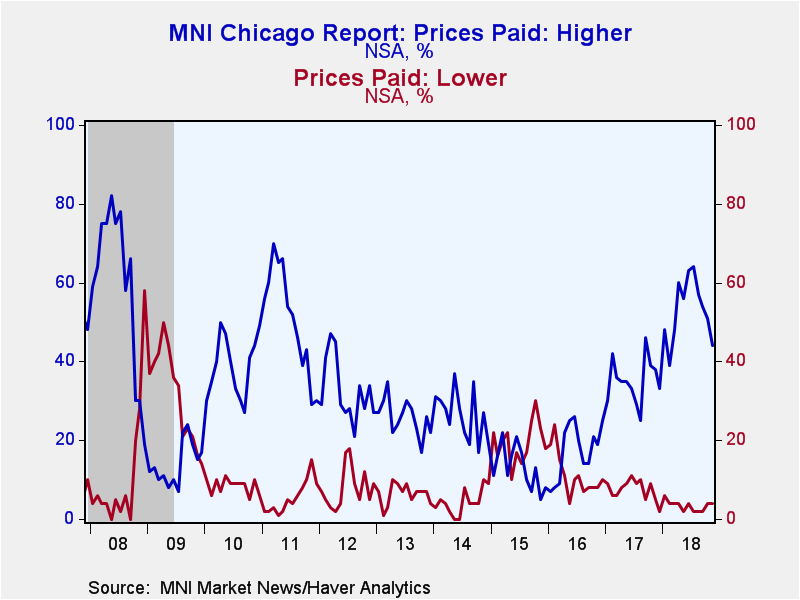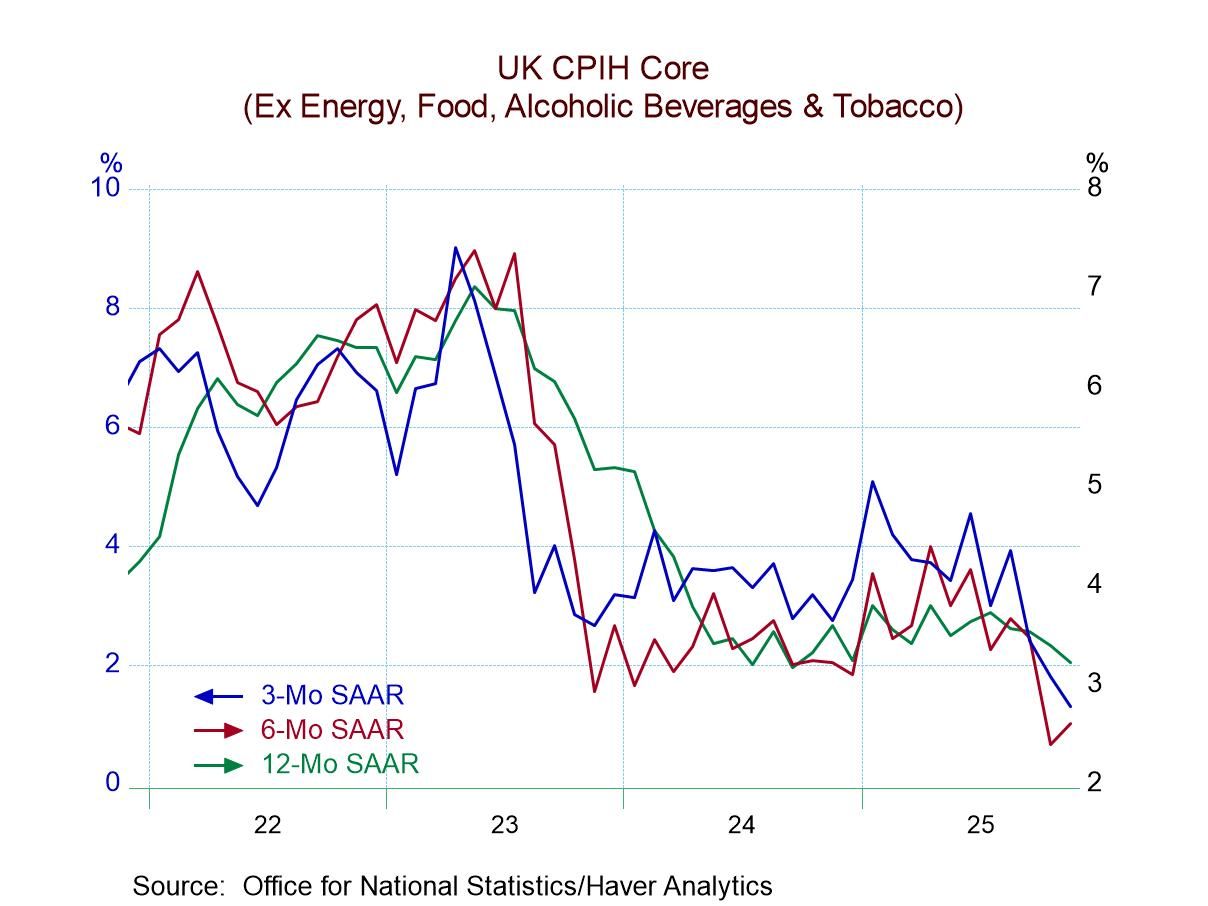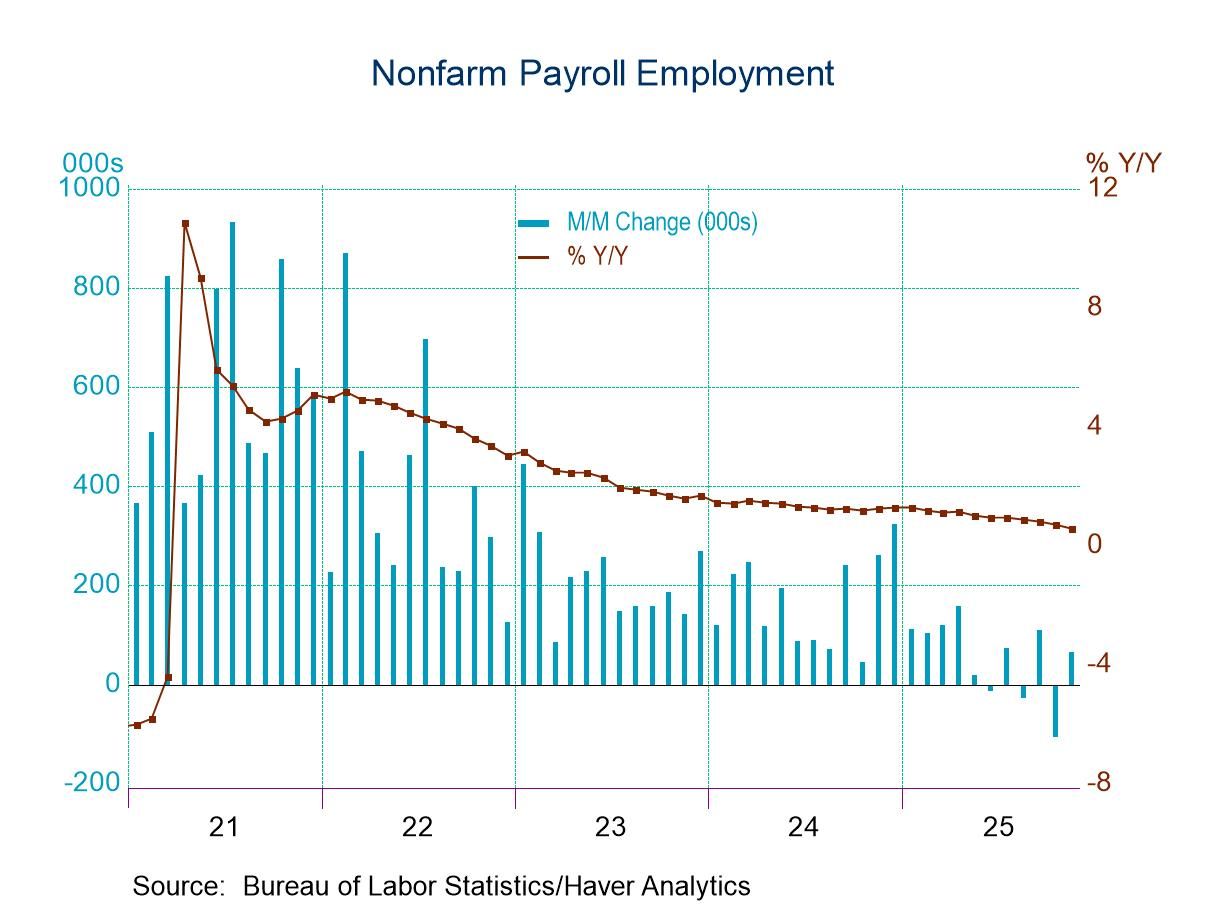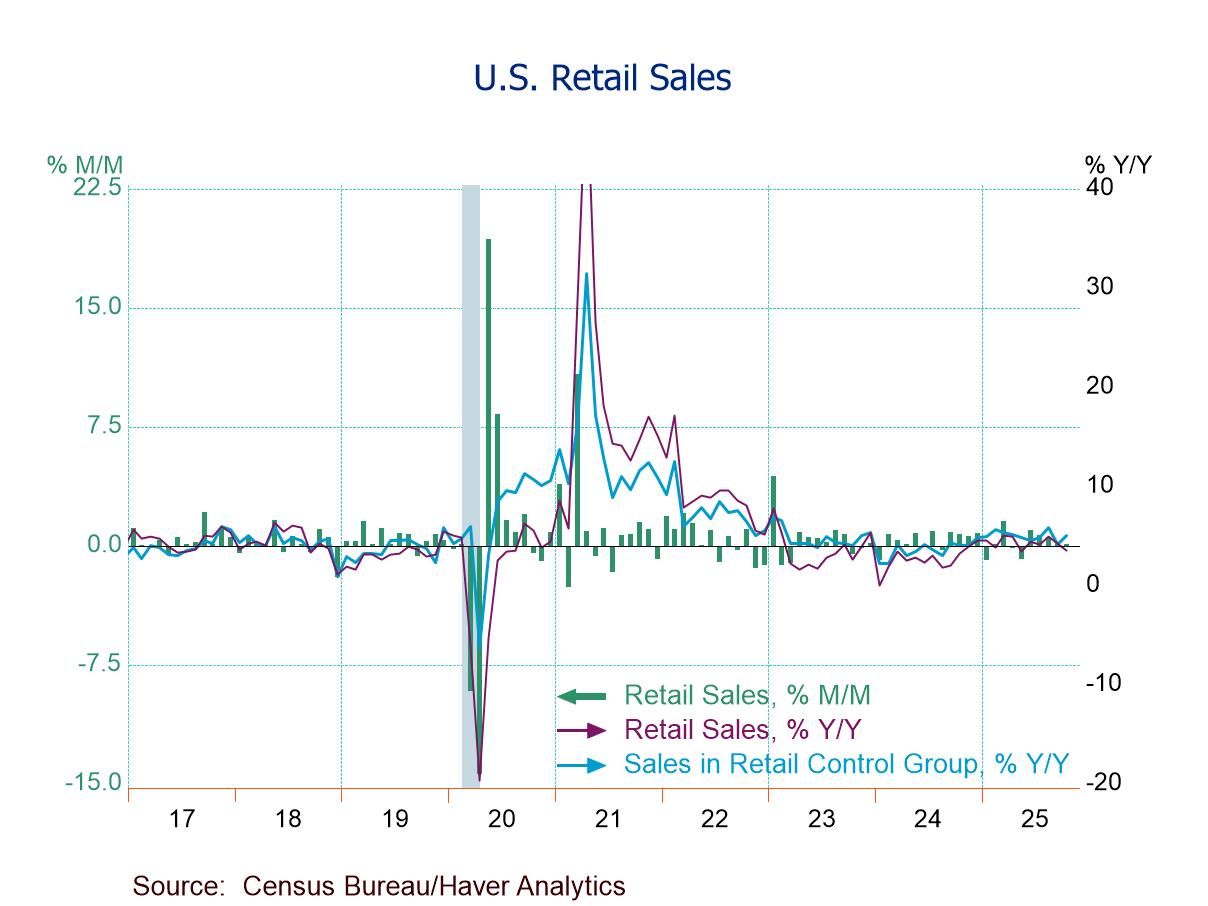 Global| Nov 30 2018
Global| Nov 30 2018U.S. Chicago Business Barometer Rebounds; Price Strength Lessens
by:Tom Moeller
|in:Economy in Brief
Summary
The Chicago Purchasing Managers Business Barometer surged to 66.4 during November from an unrevised 58.4 in October. It was the highest level since December and followed three consecutive months of decline. The Action Economics [...]
The Chicago Purchasing Managers Business Barometer surged to 66.4 during November from an unrevised 58.4 in October. It was the highest level since December and followed three consecutive months of decline. The Action Economics Forecast Survey expected a reading of 59.4. The Chicago Purchasing Managers figures are diffusion indexes where readings above 50 indicate growth.
Haver Analytics constructs an ISM-Adjusted index with similar methodology as the ISM Composite Index. This index improved m/m to 63.1, but remained below earlier highs. During the last ten years, there has been a 61% correlation between the index level and the quarter-on-quarter change in real GDP.
A surge in the new orders and unfilled orders components led the improvement in the Business Barometer. The production and supplier delivery readings also rose. The latter indicated the slowest product delivery speeds since 2011. The inventories reading fell sharply to the lowest level since June.
The employment index strengthened m/m but remained below the high reached in January. During the last ten years, there has been a 79% correlation between the index level and the month-to-month change in factory sector payrolls. Twenty-eight percent (NSA) of survey respondents reported higher payroll levels while 17% (NSA) indicated lessened hiring.
The index of prices paid weakened for the fourth consecutive month. The reading of 73.2 was the lowest level since May and down from July's 82.1. A greatly lessened 44% of respondents reported higher prices while a steady four percent reported price declines. These figures are NSA.
The MNI Chicago Report is produced by MNI in partnership with ISM-Chicago. The survey covers a sample of over 200 purchasing professionals in the Chicago area with a monthly response rate of about 50%. Summary data are contained in Haver's USECON database, with detail including the ISM-style index in the SURVEYS database. The Action Economics Forecast Survey is available in AS1REPNA.
Monetary Policy Strategies for a Low-Neutral-Interest-Rate World is the title of today's speech by John C. Williams, President and CEO Federal Reserve Bank of New York. It is available here.
| Chicago Purchasing Managers Index (%, SA) | Nov | Oct | Sep | Nov '17 | 2017 | 2016 | 2015 |
|---|---|---|---|---|---|---|---|
| General Business Barometer | 66.4 | 58.4 | 60.4 | 65.6 | 60.8 | 53.1 | 50.3 |
| ISM-Adjusted General Business Barometer | 63.1 | 59.7 | 58.9 | 64.3 | 59.0 | 52.0 | 51.6 |
| Production | 65.2 | 59.8 | 58.8 | 70.3 | 64.3 | 54.7 | 52.5 |
| New Orders | 72.5 | 57.9 | 61.4 | 67.9 | 63.5 | 55.7 | 50.4 |
| Order Backlogs | 62.9 | 51.2 | 61.9 | 58.2 | 55.2 | 47.2 | 44.4 |
| Inventories | 53.7 | 60.2 | 60.6 | 59.1 | 54.9 | 47.2 | 52.1 |
| Employment | 55.4 | 52.5 | 51.1 | 56.4 | 52.9 | 49.4 | 50.3 |
| Supplier Deliveries | 68.7 | 68.3 | 62.5 | 68.0 | 59.4 | 52.8 | 52.6 |
| Prices Paid | 73.2 | 75.1 | 79.9 | 68.9 | 64.0 | 53.2 | 46.8 |
Tom Moeller
AuthorMore in Author Profile »Prior to joining Haver Analytics in 2000, Mr. Moeller worked as the Economist at Chancellor Capital Management from 1985 to 1999. There, he developed comprehensive economic forecasts and interpreted economic data for equity and fixed income portfolio managers. Also at Chancellor, Mr. Moeller worked as an equity analyst and was responsible for researching and rating companies in the economically sensitive automobile and housing industries for investment in Chancellor’s equity portfolio. Prior to joining Chancellor, Mr. Moeller was an Economist at Citibank from 1979 to 1984. He also analyzed pricing behavior in the metals industry for the Council on Wage and Price Stability in Washington, D.C. In 1999, Mr. Moeller received the award for most accurate forecast from the Forecasters' Club of New York. From 1990 to 1992 he was President of the New York Association for Business Economists. Mr. Moeller earned an M.B.A. in Finance from Fordham University, where he graduated in 1987. He holds a Bachelor of Arts in Economics from George Washington University.


